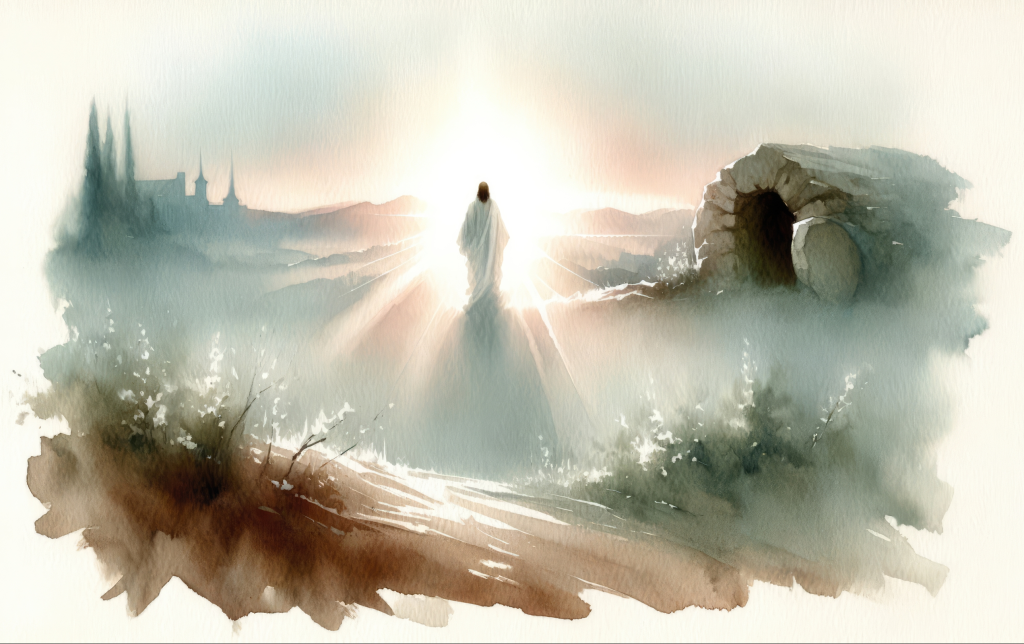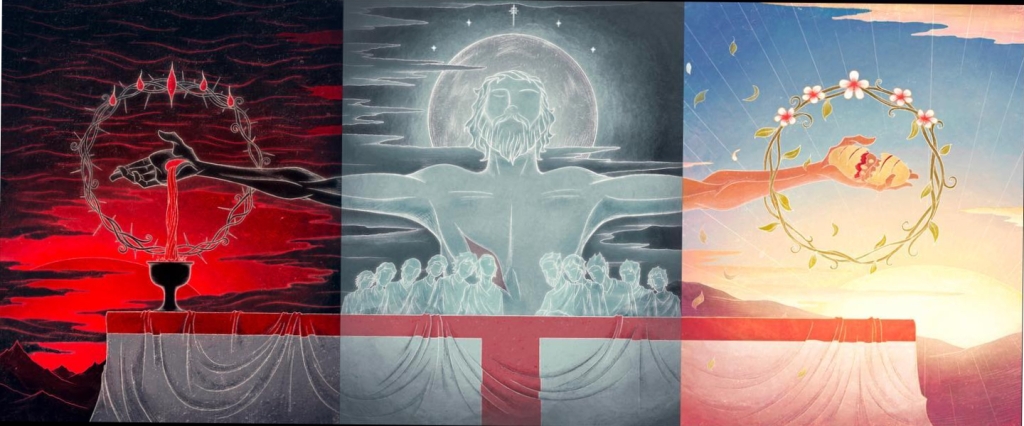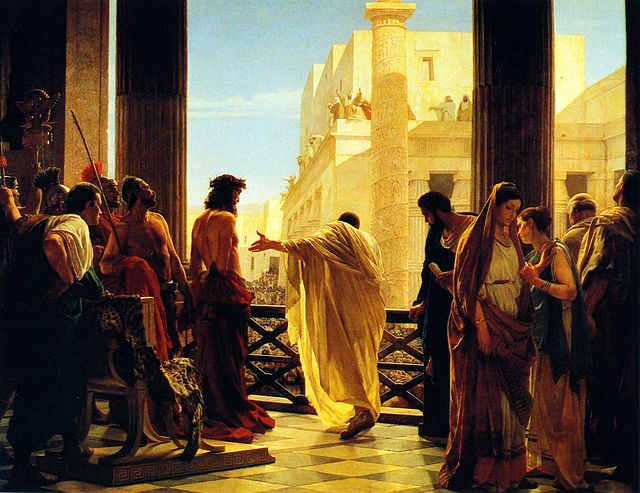
Mark 16:1–8
1 When the Sabbath was past, Mary Magdalene, Mary the mother of James, and Salome bought spices, so that they might go and anoint him. 2 And very early on the first day of the week, when the sun had risen, they went to the tomb. 3 And they were saying to one another, “Who will roll away the stone for us from the entrance of the tomb?” 4 And looking up, they saw that the stone had been rolled back—it was very large. 5 And entering the tomb, they saw a young man sitting on the right side, dressed in a white robe, and they were alarmed. 6 And he said to them, “Do not be alarmed. You seek Jesus of Nazareth, who was crucified. He has risen; he is not here. See the place where they laid him. 7 But go, tell his disciples and Peter that he is going before you to Galilee. There you will see him, just as he told you.” 8 And they went out and fled from the tomb, for trembling and astonishment had seized them, and they said nothing to anyone, for they were afraid.
Alleluia! Christ is risen!
He is risen indeed! Alleluia!
In the name of Jesus. Amen.
That day began like any other day in that garden. While the city slept, daylight began to peek over the horizon. Birds began to rustle in the bushes and branches. They didn’t have any songs yet, just little chirps here and there. A light breeze rustled through the trees, but otherwise everything was silent and still.
For the women, any other day like this would have seemed utterly and completely normal. But everything that had transpired on Friday made this morning bitterly different. They had woken up early, well before the sun had risen. They walked out of the city walls in complete silence, each of them carrying a bundle of spices. They were returning to the place they had seen Him laid, and every step was agonizing but not because the path was difficult to walk. That wasn’t the problem. This trek was painful because His tomb was in the shadow of where they had stood for three hours watching Him die (Jn. 19:41). And those memories were still bitterly fresh and raw. But they had to go. They had a job to finish.
Their intention was to give Him a proper burial. It was something they had done for countless others back home in Galilee. But as they approached the garden, their plans were interrupted. They started to worry because they remembered the large, heavy stone that stood between them and their task. They had completely forgotten to calculate it into their plans. “Oh no! What are we going to do about that stone?” “We could go back and get some of the disciples to move it for us.” “No, that won’t work. The guards aren’t going to let them anywhere near His body.” “Ok then. What do you suggest we do?” “I guess we keep going. We’re almost there anyway. Maybe the guards will move it for us. If they won’t, we’ll just figure something else out.”
But then, as they came into the clearing, Mary saw something. The stone had been rolled back. It was laying there, face down. Somehow, the grave looked different. On Friday, the mouth of that tomb looked like the fierce jaws of a predator ready to snap shut. Now, it looked as weak and harmless as a limp, drooling mouth of someone who had unintentionally fallen asleep in a chair.
Those women had planned to anoint the body of a dead Man, but their plans were irrelevant. There was no dead man there. Those women were worried about the heavy stone, but their anxiety was a moot point. It had already been tossed aside by the angel who now sat on it in mocking it (Mt. 28:2).
All the plans of the women, all their worry and anxiety, all their calculations of how this day would go – all of that was thrown out the window because this was no normal day. It was the first day, and not just the first day of the week. It was the first day of something much, much, much greater. It was the first day of the new creation. It was the first day of the Resurrection of the dead. Jesus is the firstfruits, and the full harvest will come soon (1 Co. 15:20, 23).
It wasn’t just the women who had their plans changed and their worries wiped away that day. The guards had planned to watch over Jesus’ dead body to prevent the disciples from stealing it, but hose plans didn’t matter. One, they didn’t matter because Jesus wasn’t, still isn’t, and never for the rest of eternity done with His body. And two, they didn’t matter because the disciples were afraid and locked in the house (Jn. 20:19, 26). I imagine those guards were worried about getting this assignment. “They want us to guard a dead body? This must be some sort of demotion.”
The religious leaders had plans to destroy Jesus (Mt. 27:20), but all they could do was kill Him. And when the Son of God dies, He doesn’t stay dead. Those religious leaders planned to annihilate the Son of David, their King, and have no king but Caesar (Jn. 19:14-21). But now, Jesus is risen and ascended into heaven, seated at God’s right hand on the throne of creation with all authority in heaven and on earth (Mt. 28:18, Col. 2:10). The devil planned to strike Jesus, but he only got Christ’s heal. And now, the devil’s head is crushed (Gen. 3:15).
Christ’s Resurrection requires – even demands – a change of plans. It doesn’t matter if the plans are to do good things like the women, and it doesn’t matter if the plans are for evil like the religious leaders, the rulers, the soldiers, and the devil. None of those plans end up mattering because Christ is risen.
Now, this doesn’t mean you shouldn’t ever make any plans. Don’t let that be your conclusion. Instead, what it means is this: only what God plans matters. God’s plan is what is going to happen. God’s plan is what you can count on. So Christian, whatever plans you make, make them with your mind set on Christ your crucified, risen, ruling, reigning King. Every plan you make, make it by first setting your mind on Christ who is seated at the right hand of God because when Christ who is your life appears, you also will appear with Him in glory (Col. 3:1-4).
This also means that, whatever worries and anxieties you have, now they matter a whole lot less. Christian, because of Christ’s Resurrection, you can now look at everything – all the sin, evil, sickness, injustice, opposition, wickedness, and death in this world – you look at all of that through a different lens, the lens of Christ’s Resurrection.
That lens makes everything clear. That puts everything into its proper perspective. That is how things actually are in reality. The Resurrection has forever changed creation. Your sins are died for and forgiven. And Jesus is out of the tomb proving that God accepted His sacrifice. Death and the grave are defeated. Satan is crushed. And because Christ is risen, so will you.
Today and every day, celebrate that this morning, and every other morning of your life, is no normal morning. Every morning is another morning in the Resurrection. Your Redeemer lives. At the end, He will stand triumphant upon the earth. You will see Him with your own eyes (Job 19:25-26). You can plan on it. Amen.
Alleluia! Christ is risen!
He is risen indeed! Alleluia!
The peace of God, which surpasses all understanding, will guard your hearts and minds in Christ Jesus. Amen.







You must be logged in to post a comment.